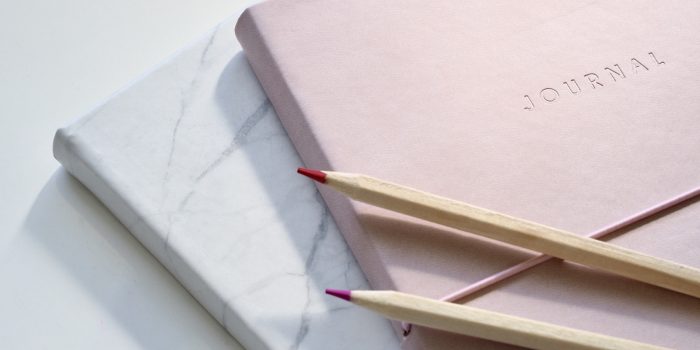I’ve found there is no one-size-fits-all technique to journaling. If you think you’d like to start an effective journaling practice, I’m sure there is style to fit your needs. There are dozens of types of journals, and the reasons for keeping a journal are as varied as the people who keep them.
One of the first steps to get started is to determine what “journaling” means to you. To many people, journaling means you have to spend hours and write pages of poetic images about your feelings. But really, the main requirement is to set aside a little undistracted time to think and write, about anything you want to write about. It can be a simple record of your day, something that made you smile, venting about that annoying thing that happened to you at work, or even recording your stream of consciousness. There’s an old saying that a diary tells what you did that day, but a journal tells how you feel about what you did that day.
The next step is to find a habit that works for and with you. You will probably have to experiment a bit to find a time and place that works best for you. Many people enjoy starting their morning with quiet reflection, while others like to recap their day in the evening. Still others steal a few minutes here and there. While some so-called experts insist that journaling be done daily, many of us manage weekly or even sporadic attempts. That’s the satisfaction of journaling. It’s for your eyes only and it’s what suits you.
Some people swear by an app like Journey, Penzu or Diaro, which allows you to use your smartphone or notebook to record your thoughts and organize your entries. Others are equally adamant that pen and paper are necessary tools.
Whichever format you prefer, you can modify to suit your personal needs and desires. Really creative types have combined scrapbooking or art with journaling for some beautiful keep-sakes. A quick search on-line shows a wide selection of journals, in all price ranges. But don’t let the desire for the perfect tools overshadow the objective of journaling: recording your thoughts.
One of the major benefits of journaling is it promotes mindfulness. Gratitude journals or prayer journals focus on this especially. But any writing that focuses on experiences, thoughts, and feelings, can help you understand them better. If you struggle with stress, anxiety, or depression, keeping a journal can help you gain control of your emotions and improve your mental health. Expressive writing has been shown to lower stress levels. Many mental health professionals recommend writing as therapy for their patients. Writing about a positive experience allows you to relive it, boosting your mood and self-esteem. Writing about a negative experience can promote healing. Writing allows you to make sense of it or make peace with it from a safe distance.
Journaling also will get juices flowing for other writing and improve any other writing you do. Since your journal is usually private, it can be a place to experiment with thoughts and ideas that may be developed later and incorporated in your other writing.
Other benefits of journaling are improved memory and better organization. Regular diary-style writing can improve short-term memory. Teachers have long recognized that students learn and remember better if they write information down. Keeping a journal as you work toward a goal, such as weight-loss, can keep you focused and record your progress.
The internet is full of ideas and suggestions for effective journaling, from writing a few brief notes on a daily calendar, making bullet-point lists, to utilizing templates and daily writing prompts. Whether you choose old-school pen and paper or high-tech digital apps, try to keep a regular schedule so writing becomes a habit. Don’t agonize over finding just the right word; just write honestly from the heart.
You can fine-tune your technique as you go. There is really no wrong way to journal, so get started.
- Benefits of a Critique Group - January 26, 2026
- The Characters You Know - September 19, 2025
- Writing Contests - December 16, 2024


Thanks for the reminder!
From one who has innumerable journals that will probably be trash after I “move on up” I agree about journaling. Many’s the column I’ve begun or added to after reading/ remembering a journal entry. Thanks, Kim.